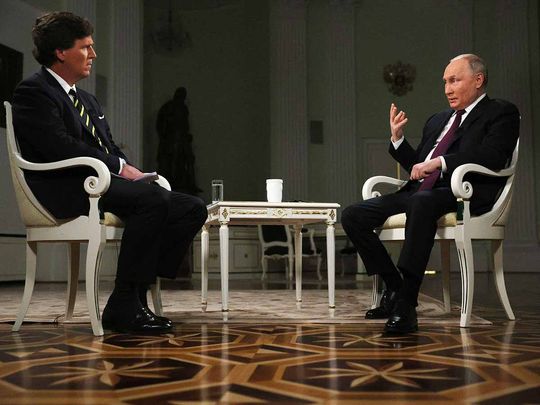
When Tucker Carlson, American conservative pundit and popular cable television talk show host, announced his intention to interview Russian President Vladimir Putin a few weeks ago, he sparked considerable controversy within the press and media circles.
Many voiced concerns that such an interview would afford the Kremlin leader an unchallenged platform to present his views on the ongoing crisis between the Russian Federation and the West. Despite these objections, the interview proceeded as planned and was subsequently made available on YouTube. In more than two-hour conversation, Putin delved into Russia’s narrative and addressed various global conflicts.
Speaking at the World Government Summit last week, Carlson reiterated his stance, emphasising his desire to provide the US public with the other perspective. Describing the interview as “sharp,” he underscored his intention to offer viewers a different viewpoint on the issues discussed.
Putin was previously quoted as saying that judo has changed his life, citing it as a sport that emphasises disrupting an opponent’s balance without causing harm, using mental and physical energy in harmony. However, the rules of judo do not apply to the realm of politics and its rules.
Russia’s rationale for announcing a “military operation” in Ukraine was to halt Nato expansion, yet the outcome was the opposite, with Nato expanding further. The French president had likened Nato to being “in the recovery room” months before the outbreak of war.
Putin delved into the rich history of Russia, tracing the gradual expansion of the Russian state before addressing the contentious and pressing matter of the conflict in Ukraine. He appeared articulate in historical and political subjects, articulating Russia’s stance on its relationship with the West.
The Russians are tough people who have historically proven resilient, with Western powers often finding it challenging to subdue them. The Russians get sick but do not die. Putin outlined the sequence of events that culminated in the war, notably Nato’s eastward expansion despite earlier assurances to the contrary.
Consequently, Russia felt encircled by “hostile powers” looming close to its borders, ultimately leading to conflict and the subsequent automatic expansion of Nato
Putin projects strength
During the interview, Putin projected strength as a strong political leader, noting that despite the economic sanctions imposed by Western powers, the Russian economy remained relatively unscathed and even partially benefited from the blockade, as evidenced by certain indicators.
He also portrayed himself as a responsible statesman when discussing military force, particularly the formidable nuclear arsenal. Speaking about the future, Putin revisited what he referred to as a “peaceful preliminary agreement” with Ukraine, which was reached in Istanbul years ago and was signed by the Ukrainian negotiator.
However, Putin alleged that the intervention of former British Prime Minister Boris Johnson persuaded the Ukrainian side to persist with the war effort.
Putin claimed that the West provided substantial financial aid amounting to approximately $70 billion to support Ukraine’s war effort, with the majority coming from the US, followed by Germany, along with additional contributions from other European countries.
Read more by Prof Mohammad Alrumaihi
What has been apparent from the interview is that Putin is keenly aware of the significant burdens facing Russia and the world due to the ongoing war in Ukraine. He appears to be looking for honourable solutions that preserve Russia’s dignity while also bringing an end to the conflict. As he stated, the Russians are resilient and determined, metaphorically preferring “death to defeat.”
The timing of the interview is quite significant, coinciding with the election campaign in the US. The race between the Democratic and Republican candidates is intense. Both potential leaders may face challenges related to trust, either due to their lack of extensive experience or concerns about their personal capabilities.
In such uncertain times, there’s a growing need to stabilise the international balance. Putin might be betting on the possibility of Donald Trump returning to the White House, given his previous inclination towards compromise and his scepticism of Nato
Putin was not expected to talk about the inflamed Middle East nor did Carlson refer to it during the interview. Maybe because major powers perceive the Middle East issue as one that can be addressed once they reach a settlement that Putin refers to as “multipolarity”.
However, this suggests that sacrifices, bloodshed, and resource waste in the Middle East are merely marginal in the struggle of great powers. This underscores the importance of unifying the Arab axis and seeking regional security to shield the region from the negative consequences of disagreements among major powers, which can be as harmful as their agreements.
Mohammad Alrumaihi is an author and Professor of Political Sociology at Kuwait University






_resources1_16a31069e4e_small.jpg)





